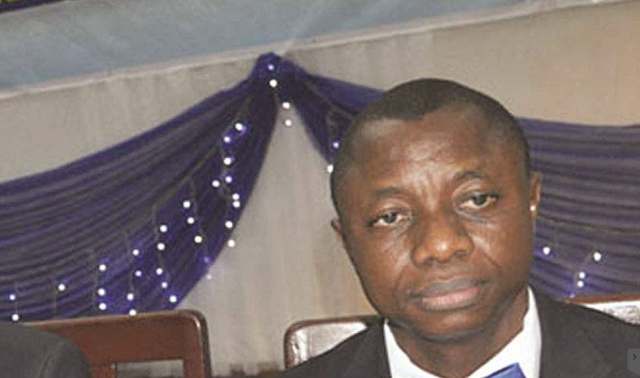COVID-19 ECONOMY: Investment in ICT key to survival of private, public sectors — Ayeku, ICSAN President

By Charles Kumolu & Nnamdi Ojiego
National President, Institute of Chartered Secretaries and Administrators of Nigeria, ICSAN, Mr. Bode Ayeku, in this interview, explains how the public and private sectors can adapt to the peculiarities posed by COVID-19. He also speaks on how the challenges associated with claiming dividends can be surmounted.
What roles does it play in the national economy?
ICSAN stands for Institute of Chartered Secretaries and Administrators of Nigeria. It is an institute established by an act of the parliament to enable the training of people to become members as chartered secretaries and administrators. It is a global institute and not something peculiar to Nigeria. We have been in Nigeria for a very long time. Officially, we had our first president in 1966, but we have been around since 1944. ICSAN is one of the few professional bodies in Nigeria that perform dual functions. Our mandate is to train people as chartered secretaries and administrators. It is the need for chartered secretaries and administrators in both the public and private sectors that necessitated the establishment of this particular institute. The beauty of the institute is that you are trained in all the relevant areas that would make you function well in both public and private sectors including financial management and financial account.
In terms of governance, how has ICSAN contributed?
In the area of corporate governance, I can say the private sector is doing extremely well but there’s still room for improvement. Recently, corporate governance dominated discussions among stakeholders in the private sector. There is this information sharing on best practices. The good thing is that most of these companies are multinationals that have their parent bodies or subsidiaries in other parts of the world. They know what they are doing there and they bring best practices here. And our regulators are improving. For example, last month, the corporate governance reporting techniques were released by the National Reporting Council. The report was forwarded to us at the institute for comments and advice. The report will guide the private sector on how to manage corporate governance because of the way it is, corporate governance is not only for the benefit of the country or companies but for also all stakeholders. Because there is a need for the sustainability of business, there is also a need to entrench corporate values and ethics in business. That is the only way businesses can succeed. To ensure continuity, structures must be put in place for the management of businesses in such a way it will cater to the interest of all stakeholders.
Coping with Covid-19
The coronavirus pandemic affects everybody including government and organizations. However, the good thing is, we migrated to digital platform last year. We did not envisage COVID-19. We just thought that we have been here for so long and it was time we migrated to virtual platform. Because of that, we were able to do a lot of things online even before the outbreak of Covid-19. When COVID-19 started, it became a matter of harvesting what we have put in place. Our programmes were not disrupted because we started working with what we have and asked the staff to start working from home while observing all the necessary safety measures. We also segmented our work in other to capture other relevant stakeholders. We started with the students and commenced online lectures for them. And for the members, we cut off anything that would bring them to office. We conduct lectures for them too and the participation was encouraging. We are also doing it for non-members. The council also scheduled all the meetings online. We just held our AGM online and that was the first time in the history of the institute.
CAC guidelines
As I said, nobody anticipated Covid-19, and I believe that there is no corporate body or organisation that made provision for Covid-19 in their budget. Unfortunately, when it happened, it came at a wrong time in the private sector. It happened in the season of AGMs. When Covid-19 came and with the restriction of mass gathering, it became impossible for any company to hold AGM as they used to do. With no hopes that COVID-19 was going away soon, the Corporate Affairs Commission, CAC, in its determination to assist the private sector hold their corporate meetings, came up with the guideline that companies can hold their meetings by proxy. It means that instead of all the shareholders attending, they can nominate a few persons within the 20 maximum limit allowed for gathering.
How are you ensuring that companies adapt to the new normal?
COVID-19 has made it inevitable for us to have a new normal. It has also thought everybody a lesson that we must massively invest in ICT. In this regard, I don’t think the private sector has many problems. The problem is with the public sector. This is the time for government to make massive investments in ICT, train their staff on how to use computers, and migrate to digital archives. The advantage of digital archives is that you can access your work in and from any part of the world. The evolution is moving away from office space to digital space. Organisations are now reducing their office spaces because there’s no need for them. We know that there is problem with electricity and internet connectivity, the good news is that we now have companies that can provide light and internet simultaneously.
Do you think COVID-19 has affected ease of doing business in Nigeria?
It is good that government is concerned and doing its best in that area. The only thing those in the private sector are asking government to do is to put in place a conducive environment for businesses to thrive. What government can do in this regard is to align its policies. Nothing disturbs the private sector than unpredictable government policies or reversal of government policies at will. There must be collaborations among government agencies. There is no way there would be ease of doing business if we still rely on the manual way of handling relationships with stakeholders. In this era of COVID-19, there shouldn’t be any need for physical interactions or physical submission of documents. Things must be done in such a way that within a particular timeline, we should be able to resolve issues. Again, there must be respect for the rule of law.
Foreign investors won’t come where there is no respect for the rule of law. When there is suspicion that the system will not be allowed to run freely, it discourages investors. The private sector can only thrive when we have receptive regulatory bodies that would be able to interface with the system. Government must compel all its agencies to migrate to e-approval platform in rendering their services. Doing so will automatically solve many problems. Electronic/virtual interactions eliminate corruption because most of the problems you see around corruption are because of physical interactions.
Solutions to unclaimed dividends
There are huge volumes of unclaimed dividends in Nigeria. It is a matter of concern for everybody and, strangely, people say Nigerians are poor, but we have idle monies kept because people don’t collect them. How do you explain it that somebody is poor when he has huge savings? That is why we have to find a solution to it. In my analysis, I have discovered several reasons for the increase in the volume of unclaimed dividends. One of the reasons which we don’t have control over is that people change their addresses without updating same with their registrars. The second point is that the current process is cumbersome. A situation where a shareholder with different companies will have to visit different registrars to process his unclaimed dividends does not help. My proposal is: instead of putting the shareholder under undue pressure, why can’t we design a simple form, a kind of one-stop shop, where shareholders can list all the companies they have outstanding unclaimed dividends and submit to just one registrar? The registrar will then, process its own aspect of the claim, after which he would electronically forward to other registrars to do the same, and the process continues like that. But there must be a time frame with which the process should be completed. In this case, the submission of one form entitles the shareholder to all his unclaimed dividends instead of the current system that encourages a shareholder to visit every registrar separately. If this is implemented, not less than 30 percent of unclaimed dividends would be claimed. The third reason is deceased shareholders.
If you look at the list of unclaimed dividends, you will see the large number of estates of deceased shareholders and because they are late, the registrars are expecting letters of administration or probate from their relatives before they can process the claims. Without letter of probate, there is nothing the registrar can do. But the real challenge is that majority of the beneficiaries do not have the money to process the dividends.
This is because you will have to pay 10 percent of the claim to government before you can claim the dividends. Now, the question is: where will a family struggling to survive get the money to pay government? Because of that, they abandoned the dividends. But we can reverse this trend by mandating the court or probate registry to write banks or registrar to transfer 10 percent of a certain amount to it within 48 hours of processing the money. The beauty of that is that nobody will have the challenge of raising money to pay government before they could process unclaimed dividends. This applies to the banks too. A huge amount of money belonging to deceased persons is in banks. The beneficiaries are suffering but can’t touch the money and banks are trading with it. We must make sure we provide access to beneficiaries of deceased estates. The Securities and Exchange Commission, SEC, Central Bank of Nigeria, CBN, and other relevant bodies should quickly do something to solve the problem as they did with the BVN and e-dividends.



Comments
Post a Comment